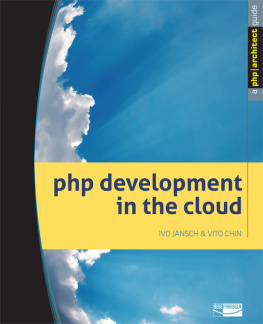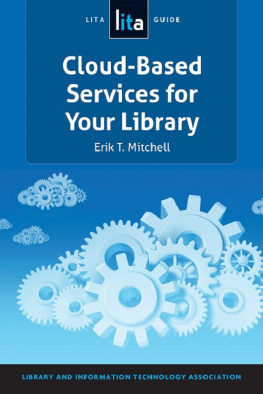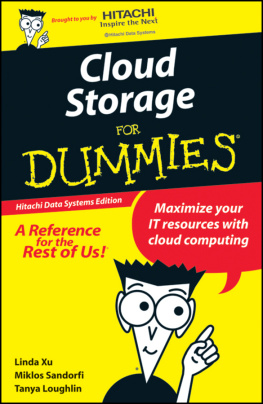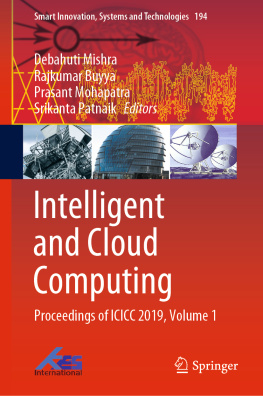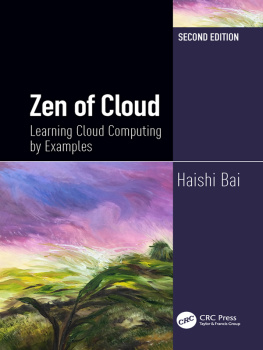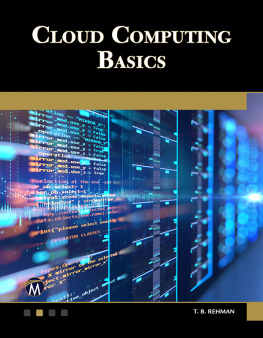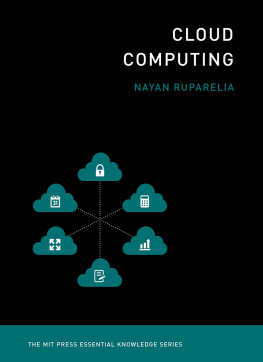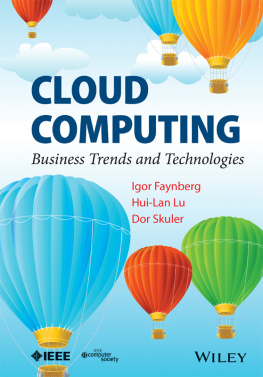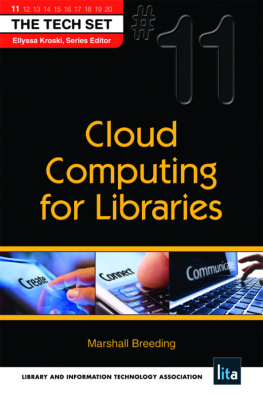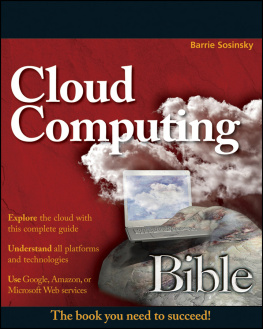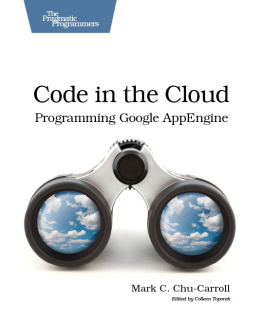
Acknowledgements
A Few Words From Vito
Some say the Sixties were a hugely influential decade. It was anera of liberation, revolution and technological advancement. Iwasn't born in the Sixties. What I know of the Sixties, I learnedfrom listening to stories from people that had lived during thatdecade, and from books, music and movies. On the software front, anentire model of cooperative software development that had shapedthe cloud as it is today had its roots in the social and politicalmovement of the Sixties.
If the Sixties gave us the spirit, the Noughties was aboutpractical commercialization, even within a free-spiritedcontext.
I once had a dog named Bobo who was never leashed. We oncebrought Bobo along on a mountain hiking trip about three miles fromour house. He wandered off as we were trekking and somehow got lostin the woods. We tried to locate him when we realized he was lost(he usually just hangs about and catch up with us) but to no avail.So, we gave up and went home. About two days later, there he waslying down on the porch, looking exhausted but still as cheerful asever.
While the Sixties instilled upon my family the idea that Boboshould roam free, the Noughties saw the introduction of functionalproducts such as GPS dog collars and Cloud-based maps to allow usto locate Bobo. We did not have GPS collars back when Bobo gotlost, because that was in the Nineties; but Bobo of the Noughtiescould had been spared the two days of wandering and sniffing aboutto find his way home. But then, he'd have missed all of theadventure.
The moral of the story is freedom. Not freedom to roam, butfreedom of choice and possibilities. As you read this book, you'llfind that many services that had marketed themselves as beingcloud-based offer such freedom of choice, and more. You couldchoose to use a GPS dog collar on your dog and worry less, orchoose not to worry at all in the first place, just as you canchoose to have that automatically scalable PaaS or think aboutscaling only when you need to. It all depends on what you want.
This book is about the cloud. The cloud is a metaphor, anidealization if you will, of the congregation of technologies andphilosophies that was forged by the ideologies of the Sixties andmade real by the commercial abilities of the Noughties. To thepeople who made a positive difference in these decades, I owe themmy gratitude.
And of course, to my family, friends, colleagues and Ivo, myco-author: thank you.
A Few Words From Ivo
One of my favorite movies is The Matrix. The concept of avirtual reality that goes as far as to provide our brains withsensory inputs is so intriguing that a few years ago I created thewebsite Simulism.org to explore the possibilities of virtual worldsand simulations of the universe. Cloud computing is a technologythat has a lot of similarities to The Matrix; it is all aboutvirtualization of resources. Applications are run on a cloudthinking they are run on physical hardware and have no idea thatthey are running on virtual hardware. You could say that The Cloudis to applications what The Matrix is to humans.
Not in the least because of this intriguing aspect, I have foundit enjoyable to explore the possibilities of what cloud computingcan offer us. While writing this book I got a really good sense ofwhat the future of computing might look like. I hope that like Vitoand me, you will become enthusiastic about cloud computing byreading about the possibilities it offers you.
I would like to thank Vito, who did the majority of the work toget this book published, and Elizabeth Tucker Long, our coach atphp|architect, for keeping an eye on our work and chasing us whenwe needed to hit deadlines; persistent but never unpleasant.
And my 93-year-old grandmother, for simply saying, I have noclue what you're writing about, but I want a copy! and of courseLeoni, for enduring the hours of solitude while I was busy gettingthis book out.
To all who have inspired this book in one way or another:thanks!
Foreword
These days, no good IT proposal or whitepaper is completewithout a section on the cloud. The cloud has become soubiquitous in IT speak that it has actually come to represent awhole host of services ranging from Software as a Service toInfrastructure as a Service. The former has been an understoodpattern for a long time in IT, while the latter is a relativenewcomer. When discussing cloud services, there are a variety oftypes of clouds ranging from Virtual Private Servers to trulyamorphous infrastructures, like Google's App Engine and Microsoft'sAzure. Truly, as we begin to inspect the cloud, we begin to seethat it is not a single thunderstorm but many localized storms thateach serves a unique purpose.
IT managers have to tread carefully; where there are clouds,there are usually slippery surfaces that can quickly put a goodproject into a tailspin. Reaching into the cloud for solutions mayseem like a good idea at the time. In many cases, pushing yourapplication into a respectable cloud run by a reputable vendor canhelp you stay safely on course, but even this path is difficult tofollow and managers should proceed with caution.
When pushing to the cloud, a manager is committing his or herapplication to that vendor's infrastructure. Since most vendorshave unique API signatures, committing to this vendor lock-in isakin to building a cloud city. These cloud cities can see theirinfrastructure quickly evaporate and their foundation blow away asvendors disappear or change strategies.
It is into this confusion of low-hanging buzzwords and bad punsthat swirl around an IT manager's head, creating confusion andobscuring true solutions - more of a fog than a cloud - that Ivoand Vito venture.
It was my great pleasure, for the majority of 2009, to live inthe Netherlands and work with Ivo at Ibuildings before he moved onto found Egeniq. One of the fun things about working with Ivo isarguing with him. It is my firm belief that Ivo will strike acontrary position, just to spark an argument. However, each time heand I engaged in a battle of wits (we did not keep score but Ifirmly believe I won more than he did), I came out the wiser.Regardless of his position, Ivo would present his case with passionand conviction. This passion carries over into his writing. I havefull confidence that this book will help you clear the fogsurrounding the cloud options you are considering and lead you tothe proper solution at the end of the rainbow.
While at Ibuildings, I also worked with Vito on severalprojects, most revolving around techPortal, Ibuildings' tutorialblog or the Dutch PHP Conference. In every contact I had with him,I came away impressed by not only his knowledge of his subjectmatter, but his passion for sharing. I feel that there is nogreater attribute a developer can have than passion. Vito obviouslyloves working with code and more importantly, sharing what he knowswith others.
Cal Evans
CMO of Blue Parabola
Introduction
This book is the result of two people's interest in both PHP andcloud computing. It explains to PHP developers what they need toknow to not only understand the cloud concept, but to be able toput it to good use. To accomplish this, we mix explanations ofcloud concepts with practical examples. All of the code snippets inthis book are examples of real-life scenarios. We hope that theyprovide you with a basis to start from when you venture into cloudcomputing, or at least give you an impression of what coding in thecloud typically means.
The Book's Structure
We have structured the book in such a way that you can eitherread it front to back, or dive into one of the chapters based on aparticular interest. We have tried to arrange the chapters in sucha way that they also provide a path from the more easy concepts tothe more complex and abstract ones.
Next page
